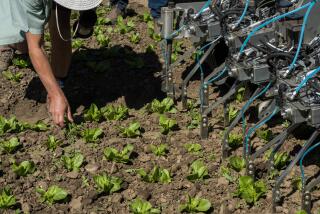From the field to the druggist
- Share via
A new type of genetically engineered crop is taking root in American soil: so-called pharma crops, or plants engineered to make drugs for humans and animals.
In recent years, scientists have been experimenting with engineering corn, soybeans, rice, tobacco and other plants to produce human hormones, vaccines and other drugs. A Canadian company, for example, is growing safflower that makes human insulin. A California company is cultivating tobacco that makes drugs against heart disease. And another California company has engineered rice to contain proteins from breast milk that can help prevent diarrheal disease, which kills millions annually in poor countries.
The research isn’t limited to the U.S.: In 2005, Japanese researchers announced they had developed an edible hay-fever vaccine made from transgenic rice.
Pharma crops are most often grown outdoors, on plots not far from fields growing food varieties of the same crops. Pharma corn grows largely in the corn belt, pharma tobacco largely in tobacco country.
So far, pharma crops are grown on relatively few acres, but some critics are concerned that they could take root where they’re not wanted or expected.
Such contamination has already occurred: In 2002, corn engineered to grow a pig vaccine was tested on plots of land in Iowa and Nebraska and ended up contaminating a Nebraska soybean crop. Hundreds of thousands of bushels of soy had to be destroyed.
“You do have the concern of these crops getting into the food supply,” says Greg Jaffe, director of the Biotechnology Project at the Center for Science in the Public Interest. “And if they do, it might harm human health.”






